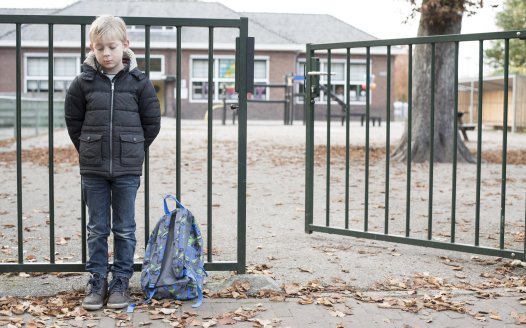NSS urges Scottish Government to tackle governance failures concerning religion in schools
Posted: Tue, 10th Jan 2017
The National Secular Society has highlighted failures in the governance of Scottish schools, identifying a string of incidents where pupils have been exposed in schools to extreme religious views.
In response to the Scottish Government's consultation on "excellence and equity in education", the Society pointed to examples where pupils had been taught creationism in schools, and where guest speakers with fundamentalist views and no scientific qualification had visited students to discuss sexual health.
The St Andrews Academy in Paisley invited religious extremist Pam Stenzel to address 150 pupils on sexual health. The Society pointed out in its response that "Stenzel has no formal training in medicine, public health, any other area of health science, or education." She has claimed that people who have more than one sexual partner in their lifetime "must pay a price".
Stenzel directly contravened Scottish Government educational guidelines with "words selected to confer deniability" that condoms were ineffective for disease prevention.
The Society drew the Scottish Government's attention to the fact that Christian outreach workers were active in non-denominational schools, often in an unclear capacity and offering advice to teachers on religious observance without clarity about what entitled them to lead assemblies and sit on school boards.
NSS vice president and spokesperson for Scotland Alistair McBay said:
"If this is already happening in Scotland's non-denominational schools under the present system of governance, what are the implications for a revised system with more powers taken away from local councils and given to headteachers?"
A Church of Scotland parish newsletter wrote of one Christian outreach worker that he is "involved in both local primary schools, developing good relationships with head teachers, teachers and children", "leading SU groups, doing assemblies, being on the school board, doing some RE classes and giving advice to teachers on religious observance." The outreach worker "spends about one day a week in each of the two local primary schools", including a non-denominational school.
Mr McBay added:
"This relates to non-denominational primary schools in Inverness and demonstrates how Christian organisations have been able to penetrate the school governance system for their own advantage. It begs several questions."
In the consultation response the Society questioned whether such individuals were PVG checked, what qualifications these workers needed, and what qualifies such an individual to advise Highland Council teachers on RO, take RE classes, run assemblies or give advice to teachers on religious observance.
The Society asked how the delivery and content of this worker's lessons on RME and sessions of religious observance were assessed and monitored by Highland Council.
Mr McBay said this and other governance failures at both Catholic and non-denominational (in many cases effectively 'Protestant') schools highlighted in the NSS submission suggested a serious failure in organisations which the Scottish Government considered already to be key strategic partners in education delivery – casting doubt on planned reforms.
Further devolution of power to headteachers could lead to many more such abuses, the Society said, where a headteacher's evangelism of a personal faith might cloud professional judgement as in the examples raised by the Society in its response to the consultation. Because of these lapses, education partnership structures had to be properly evaluated and inspected, the Society said.
Additionally, calls from religious organisations for separate inspections regimes should be resisted, or else the Scottish Government would jeopardise effective science teaching and sex and personal relationship education.
The NSS submission also called for an end to church-appointees to Local Authority Education Committees. At present, Scottish law requires Local Authority Education Committees to include Church nominees. Church appointees are immune from electoral scrutiny, do not have to declare their outside interests and hold the balance of power on 19 of Scotland's 32 Education Committees.
The NSS submission said:
"Affording a particular section of society an appointed privileged position within the decision-making process of local government, based solely on their personal religious beliefs, is profoundly and inherently undemocratic, unfair and discriminatory."
The Society also urged the Government to remember that "successful outcomes are in no way dependent on the existence and promotion of any particular 'religious ethos' since there are many high performing schools who manage to achieve successful outcomes and a community spirit without such."
The submission also called for a move away from denomination schooling, urging the Scottish Government to do everything it can to ensure that children of all faiths and none are educated together in inclusive schools.
"Government policy should seek to break down barriers, not erect them", said the NSS.







